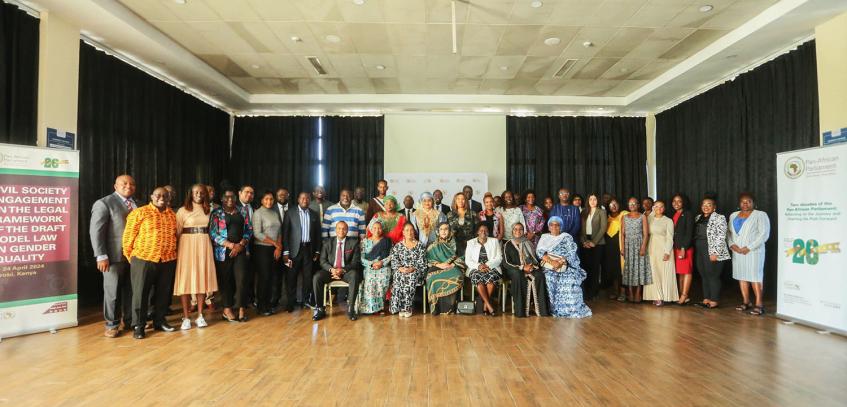The Pan-African Parliament, the legislative arm of the African Union (AU), has begun public hearings today in Nairobi, Kenya, in collaboration with the AU Economic, Social, and Cultural Council (ECOSOCC), with grassroots organizations from the Northern, Central, Eastern, and Western Regions. The purpose is to finalize the Legal Framework pertaining to the draft Model Law on Gender Equality.
The objective of the Civil Society Engagement (CSO) is to ensure that both the policy framework on the Model Law and the draft Model Law itself incorporate the views and aspirations of the African people, aligning with the Pan-African Parliament's mandate. This process, expected to span three days, follows previous consultations held in Lusaka in July 2023 for the Southern Region.
During the opening ceremony, Hon. Prof Massouda Mohamed Laghdaf (Mrs), First Vice-President of the Pan-African Parliament, emphasized the importance of involving African citizens in finalizing the Model Law. This reflects the Parliament's vision to provide a platform for citizen participation in addressing the continent's challenges. She also highlighted the pivotal role of CSOs in advancing progress in gender equality and the objectives of the Model Law.
"The engagement is crucial as it will promote the Model Law and enable grassroots organizations to participate in the Parliament's and ultimately the AU's decision-making processes, aimed at enhancing their well-being. Achieving equality between men and women is a pervasive issue that impacts all the objectives of the PAP. While achieving full emancipation of women worldwide remains a significant challenge, their evolving role is undeniable."
"These three days of consultation aim to dismantle barriers hindering the development and recognition of women's rights on par with men. To the civil society representatives present here today, I extend our heartfelt gratitude for your exceptional efforts. The Pan-African Parliament is committed to enhancing collaboration with your organizations to collectively build a continent characterized by peace, security, and citizen-driven development," remarked Hon. Laghdaf.
Hon. Houmadi Ladaente, on behalf of Hon. Mariam Dao Gabala (Mrs), Chairperson of the Pan-African Parliament Committee on Gender, Family, Youth, and People with Disabilities, recalled the background of the Model Law and highlighted the next steps in the formulation process.
"The formulation of the Model Law originated from a Resolution introduced by the Committee on Gender, passed at the First Ordinary Session of the Sixth Parliament in November 2022. The Pan-African Parliament committed to actualizing equality in Africa through this Resolution, aiming to bridge the gap of gender inequality and fulfill the objectives of Agenda 2063. The first stage of this project is to determine the logical framework of the Model Law through consultations, aiming to identify deficiencies in the Maputo Protocol and propose measures to address them in a model law."
Mr. William Carew, Head of the ECOSOCC Secretariat, the Civil Society Organ of the African Union, described the pivotal role of the partnership with the Pan-African Parliament in harmonizing continental and regional efforts to achieve the objectives of the AU Agenda 2063 through CSO involvement. He presented the public hearing as a catalyst for facilitating the formulation of a Model Law on Gender Equality.
"We are extremely pleased with this PAP-ECOSOCC partnership. If all stakeholders present here today unite forces, we can go a long way together. At the end of the consultations, let's hope that we can identify the deficiencies in the Maputo Protocol and propose measures to address them in a model law. We also need African CSOs to support us in raising awareness about the significance of effective implementation of the Maputo Protocol and its incorporation into domestic legal frameworks concerning safeguarding women’s rights," said Mr. Carew.
Ms. Jackline Nekesa, Representative from the Ministry of Public Service, Youth, and Women Affairs of the Republic of Kenya, expressed gratitude to the Pan-African Parliament and ECOSOCC for choosing Nairobi as the location for these history-making consultations in the journey to attaining total gender equality in Africa.
"On behalf of the government and people of Kenya, we welcome all participants to the city of Nairobi. Kenya’s gender equality commitments regarding the advancement of gender equality, women, and girls’ empowerment are enshrined in the Constitution of Kenya, legal and policy environment, and outlined in the gender machinery’s mandates. We are committed to working with the African Union and its different organs to ensure that gender equality is regarded as essential for the development and well-being of society and seeks to address the inequalities and discrimination that women face in all aspects of their lives," said Ms. Nekesa.
Over the next three days, feedback and recommendations gathered through consultations with civil society will be incorporated into the legal framework of the draft model Law. This process also aims to raise awareness and understanding of the Maputo Protocol and its role in safeguarding women's rights. Adopted by the African Union in July 2003, the Maputo Protocol is a legally binding instrument that aims to promote and protect the rights of women in Africa, with a focus on gender equality.








